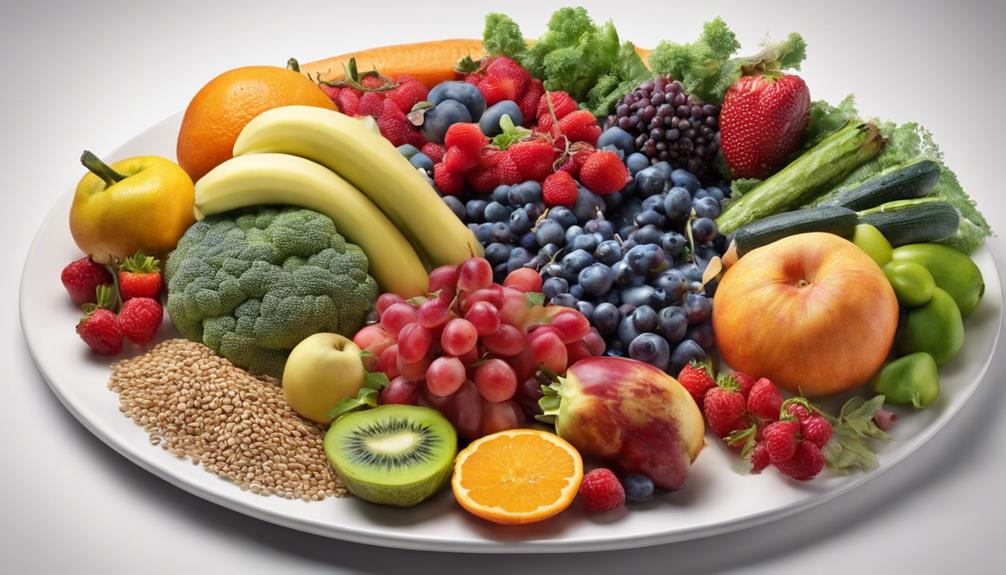As we navigate through the intricate web of nourishment for breastfeeding mothers, protein stands as the sturdy cornerstone, akin to a lighthouse guiding ships through stormy waters.
The consumption of protein-rich foods carries profound implications for both maternal health and infant development, intertwining their well-being in a delicate dance of sustenance.
But what about the lesser-known intricacies of protein intake during the postpartum phase?
Let's unravel the layers of this essential nutrient's role in the journey of motherhood, shedding light on its significance beyond mere sustenance.
Key Takeaways
- Protein is crucial for postpartum recovery, milk production, and infant health.
- Nursing mothers need an extra 25g of protein daily for optimal milk supply.
- Best protein sources include lean meats, fish, eggs, dairy, and plant-based options.
- Aim for 70-100g of protein daily through diverse sources for energy and baby's needs.

MILK DUST Protein Powder 660g | Breastfeeding Powder for Nursing Moms | Lactation Support Pea Powder | Vegan & Dairy-Free | Sweet Vanilla | 22 Servings (Vanilla.)
NUTRITIONAL BOOST FOR NURSING MOMS: Milk Dust's protein powder is designed to give nursing mothers the energy boost…
As an affiliate, we earn on qualifying purchases.
As an affiliate, we earn on qualifying purchases.
Benefits of High Protein Diet for Breastfeeding Moms
A high protein diet for breastfeeding moms greatly supports tissue repair, hormone regulation, and antibody formation after childbirth. This nutrient intake isn't only essential for the mother's postpartum recovery but also plays a critical role in ensuring the health and development of the baby.
During breastfeeding, the body's demand for protein increases greatly to sustain milk production, especially during cluster feeding periods. Infants, who undergo rapid growth, require substantial protein for healthy development, making a high protein diet essential for nursing mothers.
By consuming an extra 25g of protein daily, breastfeeding women can adequately support milk production and contribute to the overall well-being of both themselves and their babies. A nutritious diet, including a high protein diet, not only enhances milk supply but also promotes healthy growth and immune function in breastfeeding infants.
Prioritizing protein intake can positively impact both the mother's recovery and the baby's health during this critical phase.
lean meats and fish for postpartum nutrition
As an affiliate, we earn on qualifying purchases.
As an affiliate, we earn on qualifying purchases.
Protein Requirements for Nursing Mothers

Nursing mothers must be mindful of their increased protein requirements to effectively support both their own postpartum recovery and their baby's growth and development. Adequate protein intake is essential for various processes like tissue repair, hormone regulation, and antibody formation, all of which are necessary after pregnancy. During breastfeeding, an additional 25 grams of protein daily is needed to sustain milk production and aid in the rapid growth of the baby. A high-protein diet becomes even more important during cluster feeding periods to meet the demands of increased milk production. Ensuring ideal nutrition, including sufficient protein intake, not only enhances milk supply but also promotes overall health for both the mother and the baby. To give you a clearer picture, let's take a look at the table below highlighting the protein requirements for nursing mothers:
| Aspect | Importance | Recommendation |
|---|---|---|
| Milk Production | Crucial for sustaining milk supply | +25g protein daily |
| Baby's Growth | Supports rapid development | Essential intake |
| Postpartum Repair | Aids in tissue recovery | Necessary for healing |

Pink Stork Pregnancy & Postpartum Protein Powder for Women, 20g Whey & Collagen, Prenatal & Breastfeeding Protein Shake Mix for Energy, Recovery & Hydration, Chocolate, 15 Servings
Pregnancy + Postpartum Protein Powder for Women: Specially formulated for expecting and new moms, this 20 g whey…
As an affiliate, we earn on qualifying purchases.
As an affiliate, we earn on qualifying purchases.
Best Protein Sources for Breastfeeding Moms
When sourcing protein for breastfeeding, lean meats like chicken, turkey, and beef stand out as excellent choices for nursing mothers. These high protein sources not only provide the necessary nutrients for you but also support the growth and development of your baby.
Fish, such as salmon, trout, and sardines, offer quality protein and essential omega-3 fatty acids, which are important for both brain development and overall health.
Eggs are another versatile option packed with choline, a nutrient essential for your baby's cognitive function.
Dairy products like yogurt, milk, and cheese are rich in protein and calcium, benefiting both you and your little one.
For those following a plant-based diet, beans, lentils, tofu, and quinoa are excellent alternatives, ensuring an adequate protein intake without compromising on essential nutrients.
Including these diverse protein sources in your diet can help maintain your energy levels and support the nutritional needs of both you and your baby during breastfeeding.

Boobie Body Superfood Protein Pregnancy and Postpartum Meal Replacement Shake, Chocolate Bliss Flavor | 19g Protein | Safe for Lactation & Motherhood | Organic, Vegan, Zero Sugar, 1 Tub (20 Servings)
Fuel your day with 19g of clean, plant-based protein, nine organic superfoods, only 1 net carb, zero sugar,…
As an affiliate, we earn on qualifying purchases.
As an affiliate, we earn on qualifying purchases.
Meal Ideas for High Protein Intake

For those seeking to boost their protein intake, incorporating a variety of protein-rich foods into meals is essential for meeting nutritional needs while breastfeeding. Here are some meal ideas to help you achieve a high protein diet:
- Lean Meats and Poultry: Incorporate grilled chicken, turkey, or lean cuts of beef into your meals for a protein boost.
- Plant-Based Protein Sources: Add lentils, chickpeas, quinoa, and tofu to your dishes to diversify your protein sources and cater to vegetarian preferences.
- Protein Smoothie: Enjoy a protein smoothie made with Greek yogurt, fruits, and a scoop of protein powder as a delicious and convenient way to increase your daily protein consumption.
Incorporating Protein Into Breastfeeding Diet
To optimize your breastfeeding diet with adequate protein intake, incorporating a variety of protein-rich foods is key for supporting both our nutritional needs and the demands of breastfeeding. Aim for 70-100 grams of protein daily to support milk production, postpartum recovery, tissue repair, hormone regulation, and antibody formation. Including lean meats, poultry, fish, eggs, dairy, legumes, nuts, seeds, Greek yogurt, and cheese can help meet these needs. Protein-rich snacks like Greek yogurt, nuts, seeds, and cheese can boost your protein intake throughout the day, enhancing energy levels and supporting your baby's growth.
Balancing protein intake is important for ensuring you have enough energy for the day while also meeting the needs of your growing baby. Lean meats provide high-quality protein, while Greek yogurt offers a convenient and tasty snack option. Nuts and seeds are great sources of healthy fats and protein, contributing to overall nutrient intake and fulfilling your protein requirements during this critical postpartum period. By incorporating these protein-rich foods into your diet, you can nourish both yourself and your baby effectively.
Frequently Asked Questions
What Is a High Protein Diet for Breastfeeding Moms?
We focus on a high protein diet for breastfeeding moms, emphasizing 75-100 grams of protein daily to support milk production and postpartum recovery. Lean meats, poultry, fish, eggs, dairy, legumes, nuts, and seeds are essential.
How Much Protein a Lactating Mother Requires in a Daily Diet?
We require about 1.1 grams of protein per kilogram of body weight daily during lactation. Protein-rich foods like lean meats, eggs, dairy, legumes, nuts, and seeds are crucial for milk production and recovery. Ensuring this helps with health and milk supply.
How Can I Fatten up My Breast Milk?
We can increase healthy fats in our diet with foods like avocados and nuts to fatten up breast milk. Including foods rich in omega-3s, like salmon, and staying hydrated can improve the fat content for our baby.
What Extra Nutrition Is Needed for Lactating Mothers?
We need extra nutrition while breastfeeding for milk production and recovery. Protein is vital for tissue repair, hormone regulation, and antibody formation. A high-protein diet supports milk production during cluster feeding, aiding baby growth and our health.
Conclusion
To sum up, incorporating a high protein diet into your breastfeeding routine can greatly benefit both you and your baby.
Did you know that just one serving of lean meat provides about 25 grams of protein, helping to support tissue repair and milk production?
By focusing on protein-rich foods and meeting your daily intake recommendations, you can guarantee a healthy postpartum journey for you and your little one.
Stay nourished and enjoy this special bonding time with your baby!









